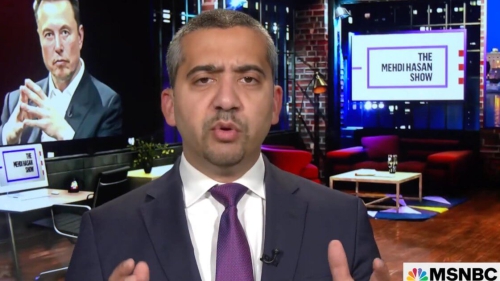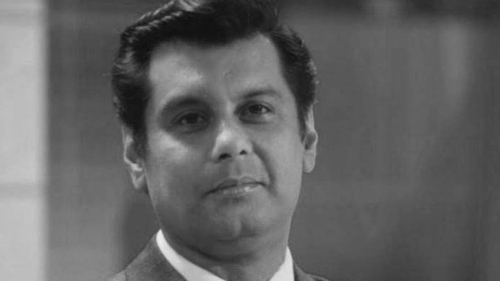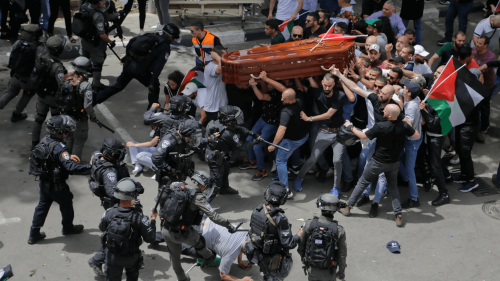Inventing the 'Enemy Within'
The recent police searches of American-Muslim business and working premises and the arrests of American Muslims in the United States highlights the growing sense of misdirected fear, apprehension and prejudice that has taken root in the country in the wake of 11 September. It was interesting to note, however, that one of the American Muslims affected by the police searches stated that this was the most "un-American thing" that had ever happened to her. Ironically, one could state the opposite just as well: that such selective persecution is indeed something that has a precedent in American history, going back to the McCarthy era during the Cold War, where anyone who was thought to be Left-leaning was dubbed a potential 'security threat' to the country as a whole. McCarthyism has made a vicious comeback in the US, but this time the new 'enemy within' happens to be Muslim.
Anyone who has read Edward Said's 'Covering Islam' will know by now that one of the American media's favorite targets has always been Islam and the Muslim world. In his book Said makes the point that 'Islam' and 'Muslims' are never neutral concepts in Western media discourse, for the simple reason that both categories are ideologically and historically loaded concepts that carry with them the burden of a lot of cultural and political baggage. This perhaps explains why the view of Islam and Muslims in other parts of the non-Western world is so different. (The same Islamophobic prejudices are not so evident in Asian, Latin American and African media, for instance.)
In the wake of the 11 September tragedy - the facts of which have still yet to be fully disclosed and analyzed - the American media has once again jumped on the patriotic bandwagon, in search for new enemies to keep alive the arms industry of the world's only remaining superpower. As if in a repeat of the fiasco that followed in the wake of the Oklahoma city bombing in 1995, the American media is on the prowl for new security experts and securocrats who will be able to mesmerize the American public with tales of sinister plots and devious plans being hatched on its shores.
One of those who were interviewed by the American media in 1995 following the Oklahoma City bombing was a certain 'expert' on religious terrorism, Steven Emerson. He was one of those who claimed that the attack in Oklahoma might have been the work of Islamist militant cells operating in the United States at the time. When it was finally discovered that the group behind the attack was a local home-grown white supremacist movement, Emerson was roundly criticized by Muslim groups in the US for his part in stirring up racial and religious hatred against Muslims in the country.
But after 11 September, Emerson has been given a second chance to spin his story again, and this time the narrative has been spun even wider, ensnaring even more Muslim groups, activists and leaders among the American Muslim community. Emerson's findings are compiled in his latest book, 'Jihad in America: The Terrorists Living Among Us' which reads as a blanket condemnation of practically every single major Muslim organization in the United States today.
In his book, Emerson refers to many of the major Muslim organizations in the country - the Council on American-Islamic Relations (CAIR), the American Muslim Council (AMC), the Islamic Society of North America (ISNA), the Islamic Circle of North America (ICNA) - as part of the terrorist 'support network'. Even research institutions like the International Institute for Islamic Thought (IIIT) have not been spared. Just who the 'terrorists' are is left for Emerson himself to decide, and most of the groups he identifies as terrorist happen to be those engaged in the liberation struggle of Palestine. The fact that some of the American Muslim organizations and groups may support the struggle for self-determination in Palestine is enough for Emerson to qualify them as 'supportive' of terrorism per se, and with this broad brush he manages to tar all of them with one stroke.
There are so many worrying aspects of Emerson's book that deserve to be highlighted.
For a start, there is almost no attempt whatsoever to discuss or analyze the root causes of Muslim anger and why many Muslims in the world today have focused their attention on the United States in particular. No attempt is made to examine the emergence and rise of Islamist movements like the PLO, HAMAS and Hezbollah in the Arab world, the political and historical context of Israeli expansionism and militarism against the people of Palestine and neighboring Arab countries, and the role played by the United States in propping up the various Israeli governments all this time.
Instead, the rise of such groups like HAMAS is seen as an expression of religious extremism, devoid of political underpinnings and robbed of its proper historical context. A culturalist analysis is offered instead, which seems to conflate Islamic militancy with the religion of Islam itself, and which conflates terrorism with Muslims. In the end we are left with a reduced picture of Islam as a creed of violence as Muslims reduced to essentialist stereotypes as the new 'menace within'. Although Emerson does try to cover himself by stating that there are still many American Muslims who are peace-loving citizens, one cannot help but wonder why, then, his focus is on such a small number of alleged militants and extremists in the country. By focusing on the activities of these individuals so much (most of whom are not even American-Muslims, by the way), he has nonetheless given the impression that they represent a bigger portion of the American-Muslim community than they really do.
The other danger found in Emerson's work is the way it conveniently lumps together all sorts of Muslim organizations under the general rubric of 'extremist' groups. From academic institutions (like IIIT) to self-help groups, from research units to community centers, and from religious movements to nationalist organizations, all are put together under the same umbrella of 'militant Islam', obscuring the line between genuine Muslim organizations and what may be extremist movements. This way, a depoliticized analysis is given which completely negates the political dimension of the work of organizations like PLO and HAMAS, conveniently overlooking the fact that at the root of it all, the struggle of such organizations is aimed primarily at national liberation and self-determination.
It is interesting to see how Emerson's book sets American Muslims apart from their fellow citizens, creating a new category of impartial citizenship where Muslims are seen as American yet 'not American enough' at the same time: The book seems to give the impression that Muslims have migrated to the United States for no other reason than to engage in subterfuge and to conduct a campaign of terror against the people of the country.
The fact is, prior to the 1960s most Arabs were ambivalent about the United States. Thousands of them emigrated there and to other Western countries in search of a better life and more political freedom. The fact that the United States or the West is now seen as their enemy is of secondary import: the US only became an enemy of the Arab nationalist movements when it was obvious that it is Washington that was helping to support the Zionist government of Israel in its efforts against Palestinian self-determination. It was only when the US began to actively court and support the Zionist regime in Tel Aviv that the Arabs' perception of the US began to change: From then on the US was no longer the land of hope and plenty, but rather the ally of Israel.
All in all, Emerson's book is at best a case of over-generalization and at worst a case of prejudiced stereotyping. The fact that it singles out Islam and Muslims in particular makes it a harrowing, read, parti,cularly for Muslims who are already living and working in the West and who want to be accepted as citizens of Western countries. Already denied equal access at the job market and having to face the daily reutilized prejudice of racism, Muslims in America now have yet another albatross around their neck: Dubbed as the potential terrorists within, they are now forced to come out in defense of themselves even more, constantly having to prove their 'loyalty' to a country which does not demand the same from others. The net result from works such as these can only be the further alienation and anomie of Muslims who feel increasingly isolated and marginalized in the West. Under such circumstances, would it not make sense to rebel against the very order that oppresses them? And if they do so, who is to be blamed? The Muslims or the ones who have labeled them the new 'enemy within'?

















